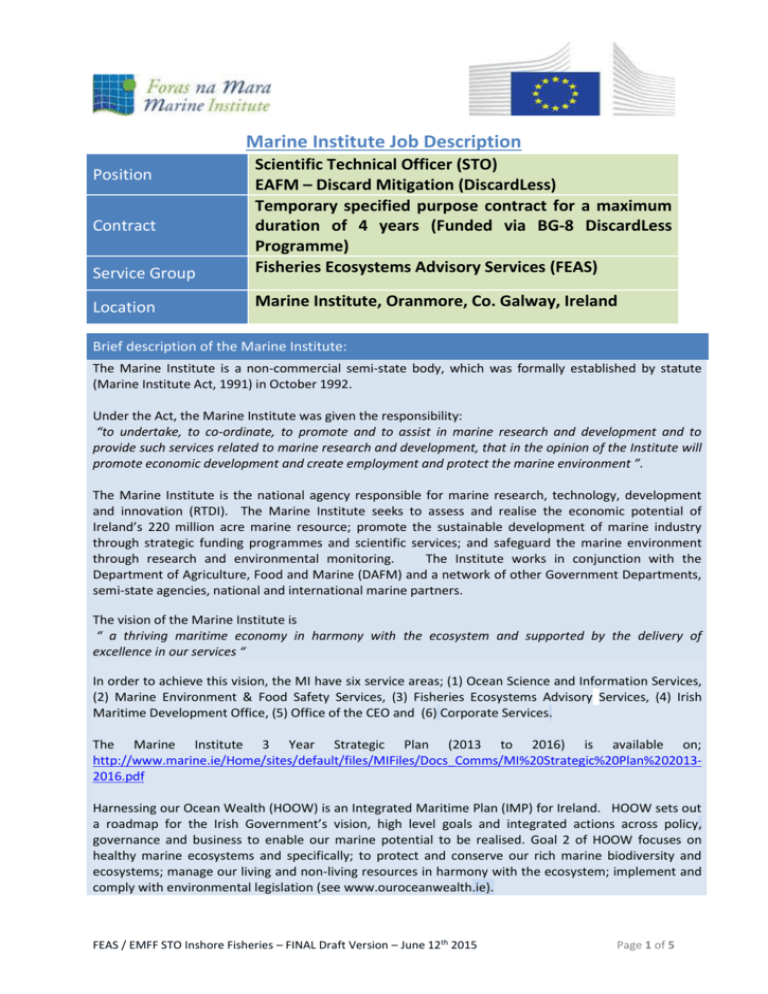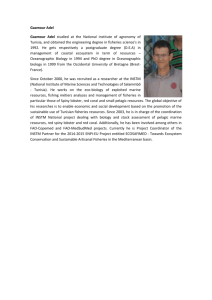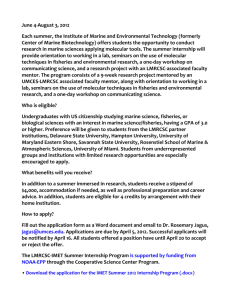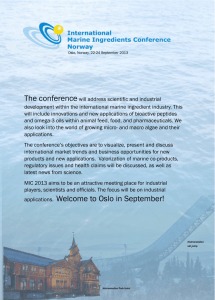here. - Marine Institute
advertisement

Marine Institute Job Description Service Group Scientific Technical Officer (STO) EAFM – Discard Mitigation (DiscardLess) Temporary specified purpose contract for a maximum duration of 4 years (Funded via BG-8 DiscardLess Programme) Fisheries Ecosystems Advisory Services (FEAS) Location Marine Institute, Oranmore, Co. Galway, Ireland Position Contract Brief description of the Marine Institute: The Marine Institute is a non-commercial semi-state body, which was formally established by statute (Marine Institute Act, 1991) in October 1992. Under the Act, the Marine Institute was given the responsibility: “to undertake, to co-ordinate, to promote and to assist in marine research and development and to provide such services related to marine research and development, that in the opinion of the Institute will promote economic development and create employment and protect the marine environment ”. The Marine Institute is the national agency responsible for marine research, technology, development and innovation (RTDI). The Marine Institute seeks to assess and realise the economic potential of Ireland’s 220 million acre marine resource; promote the sustainable development of marine industry through strategic funding programmes and scientific services; and safeguard the marine environment through research and environmental monitoring. The Institute works in conjunction with the Department of Agriculture, Food and Marine (DAFM) and a network of other Government Departments, semi-state agencies, national and international marine partners. The vision of the Marine Institute is “ a thriving maritime economy in harmony with the ecosystem and supported by the delivery of excellence in our services “ In order to achieve this vision, the MI have six service areas; (1) Ocean Science and Information Services, (2) Marine Environment & Food Safety Services, (3) Fisheries Ecosystems Advisory Services, (4) Irish Maritime Development Office, (5) Office of the CEO and (6) Corporate Services. The Marine Institute 3 Year Strategic Plan (2013 to 2016) is available on; http://www.marine.ie/Home/sites/default/files/MIFiles/Docs_Comms/MI%20Strategic%20Plan%2020132016.pdf Harnessing our Ocean Wealth (HOOW) is an Integrated Maritime Plan (IMP) for Ireland. HOOW sets out a roadmap for the Irish Government’s vision, high level goals and integrated actions across policy, governance and business to enable our marine potential to be realised. Goal 2 of HOOW focuses on healthy marine ecosystems and specifically; to protect and conserve our rich marine biodiversity and ecosystems; manage our living and non-living resources in harmony with the ecosystem; implement and comply with environmental legislation (see www.ouroceanwealth.ie). FEAS / EMFF STO Inshore Fisheries – FINAL Draft Version – June 12th 2015 Page 1 of 5 Description of appropriate Service Group: Fisheries Advisory Ecosystems Services (FEAS) The FEAS’s mission is “to assess, research and advise on the sustainable exploitation of marine fisheries resources”. Currently, FEAS consists of over 70 scientists, technical, post graduate and administrative staff under the directorship of Dr. Paul Connolly. The Service group operates a significant part of their services from the headquarters in Oranmore. Co Galway with additional port based facilities and a major research facility at Newport, Co Mayo. FEAS staff spend a considerable amount of time at sea on commercial fishing vessels and on research vessel surveys carried out on the RV Celtic Explorer and RV Celtic Voyager. A key output of FEAS is the annual Stock Book and the annual Shellfisheries Stock Book. These provide the latest assessment and scientific advice for the resources exploited by Irish vessels and is a key reference for the Governments sustainability assessment presented annually to the Oireachtas. A key element of FEAS work is the provision of scientific support for the Irish government (principally the Department of Agriculture, Food and the Marine – DAFM) on marine fisheries ecosystems related issues. FEAS also publish much of its work in peer reviewed scientific journals. The 9 goals of FEAS are: 1) To maximise the benefits of the new EU Data Collection Framework (DCF); 2) To build a strong working relationship with the fishing industry and the environmental NGO’s; 3) To build an effective working relationship with key Government Departments (principally DAFM) and other partner agencies;. 4) To use ICES, NASCO, ICCAT, OSPAR and the EU system to support the delivery of excellence in our fisheries and ecosystems science and advisory services; 5) To engage in a suite of research activity that supports the evolution of scientific advice and that is in line with MI/FEAS mission, HOOW, FH2020, Horizon 2020, the new RTDI strategy and the objectives of the CFP; 6) To progress and incorporate the ecosystem approach to Fisheries Management (EAFM) into all aspects of our work; 7) To increase public awareness of the importance of the Ocean;. 8) To Ensure a common understanding of the “ value chain” within the FEAS team and the MI; 9) To ensure FEAS is a rewarding place to work; The Work of FEAS FEAS work programmes are focused on; (1) Data Collection and Data Management; (2) Fisheries Resources Assessment and Advice; (3) Modelling, Simulations and Management Plans; (4) Fisheries - Ecosystems Interactions; (5) Stakeholder Engagement; (6) Research that supports ecosystem understanding; FEAS staff actively participate at many meetings of the International Council for the Exploration of the Seas (ICES). ICES organises many Expert Groups, Study Groups and co-ordination Groups related to provision of scientific advice on marine ecosystems. The ICES Strategic Plan (2014 to 2018) is focused on advancing scientific understanding of marine ecosystems, providing information, knowledge and advice FEAS / EMFF STO Inshore Fisheries – FINAL Draft Version – June 12th 2015 Page 2 of 5 on the sustainable management of human activities affecting and affected by marine ecosystems. ICES is a key forum for scientific co-ordination of data collection and the provision of independent scientific advice. FEAS also participate at other international fora including STECF (Scientific, Technical and Economic Committee for Fisheries), NEAFC (North East Atlantic Fisheries Commission) and NASCO (North Atlantic Salmon Commission). FEAS provide scientific support for the DCMNR at various EU meetings (e.g. the EU Norway Agreements and the EU Council of Fisheries Ministers). FEAS produce the annual Stock Book which provides the latest scientific advice on those stocks of interest to Ireland. In addition FEAS is responsible for the salmon National Coded Wire Tagging and Tag Recovery programme and work closely with IFI (Inland Fisheries Ireland) on the Standing Scientific Committees for salmon and eel. http://www.marine.ie/Home/site-area/about-us/fisheries-ecosystems-advisory-services http://www.facebook.com/#!/marineinstituteireland?fref=ts Summary of the Role: The Scientific and Technical Officer (STO) will work closely with the both the Ecosystem Approach to Fisheries Management Principal Investigator and the Demersal Fisheries Team Lead (TL) on delivering analysis and information on discard mitigation strategies in the Celtic Sea mixed demersal and Nephrops fisheries to national and international clients, principally DAFM, and the European Commission. The main task will be, working closely with scientists and fishermen, in the design, implementation, analysis and reporting of a range of different gear and strategy based approaches to reducing or eliminating discarding in Irish fisheries, as part of a pan-European study to mitigate discards in EU fisheries. The role will include working on board fishing vessels to carry out experimental tests and observations of fishermen’s tactics and operations while attempting to minimise commercial discards. The role will also include post analysis and reporting of these results, as well as using interviews and other collaborative enquiry techniques to elicit fishermen’s knowledge on how to minimise discarding. Background to Requirement: The MI has recently won an award under the EU H2020 programme entitled DiscardLess (Strategies for the gradual elimination of discards in European fisheries). This is a 31 partner European project aimed at mitigating the practice of discarding, and aims to help remove barriers to a successful implementation of the Landing Obligation, under the Common Fisheries Policy. Within the project Description of Work, the MI is responsible for WP4 - Adaption of fishing strategies, and has a strong role in WP3 - Adaption of gear technology. The main objective here will be to work with the fishing industry to identify and develop both strategies and technologies that could be used by fishing vessels that can reduce or eliminate discarding and hence achieve the objectives of the CFP. Principal Tasks: Setting up and running the collaborative experiments in discard reduction carried out with selected fishermen as scientist in charge Collect, collate and archive the resulting data Carry out the appropriate statistical and other appropriate analyses on these Carry out wider face to face interviews with fishermen to identify the best strategies for avoiding FEAS / EMFF STO Inshore Fisheries – FINAL Draft Version – June 12th 2015 Page 3 of 5 discards Contribute to the development of the discard mitigation handbook. Develop scientific information on fish distributions in time and space, including nursery areas and discarding hot spots from survey information and landings reports as well as satellite derived vessel location data, to identify a spatio-temporal approach to minimising discards Write reports and papers based on the scientific analyses. Present the work at local, national and international meetings. Publish regular articles in peer reviewed journals. Participate in and/or lead Research Surveys on commercial and research survey vessels at sea as required. Carry out any other duties assigned from time to time, appropriate to the position. Reporting Structure: The successful candidate will be based at MI Oranmore and will report to the Ecosystem Approach to Fisheries Management Principal Investigator. Contacts: Within the Marine Institute FEAS Ecosystem Approach to Fisheries Management Principal Investigator. Outside the Marine Institute DAFM, Project Partners, The European Commission, the Media, BIM, SFPA, Fishing Industry (National and International) , Environmental NGO’s, Third Level Higher Education sector. Training A full range of training will be provided as required, on the job and through appropriate courses. Training needs will be identified through the MI Performance Management Development System (PMDS). Education, Professional or Technical Qualifications, Knowledge, Skills, Aptitudes, Experience, and Training Essential: A relevant third level degree in a fisheries science, renewable resource management, marine science or related field, with at least one year of relevant work experience. Demonstrated experience of relevant field biological sampling – catch analysis. Understanding of the operational aspects of fishing in terms of gears and strategies. Understanding of discarding issues and legislation in EU fisheries management - issues and approaches. Excellent interpersonal skills and an ability to work with and effectively communicate with the fishing Industry and stakeholders. High level of experience in the use of Microsoft Office applications. Statistical analysis skills (ideally implemented in R). Proven Scientific Report Writing Skills. Effective organisation and administration skills. Good time management and the ability to prioritise and meet deadlines. The ability to work unsupervised and as part of a team. FEAS / EMFF STO Inshore Fisheries – FINAL Draft Version – June 12th 2015 Page 4 of 5 Good written and verbal communication skills in addition to effective numeracy skills. Sea going experience or sufficiently fit to pass an ENG II Medical. Full, clean driving license. Desirable: Experience with spatial data analysis and GIS. Strong data handling and data manipulation skills (e.g. experience of SQL server, Access, or other relational databases ). Understanding of the issues surrounding Ecosystem Based Fisheries Management. Experienced user of fisheries assessment models or similar. Experience with commercial and research vessel fisheries surveys and sampling programmes. A good knowledge of the Irish fishing industry. Special personal attributes required for the position: Dynamic and reliable. An ability to work in an organised manner and progress work independently. Self-sufficient while being a good team player. Experience in collaborating with scientists and members of a technical team. Ability to work diplomatically in resolving issues with stakeholders. Salary: Remuneration is in accordance with the Public Sector, Department of Finance approved Salary Scale for the Scientific & Technical Officer (Engineer III grade) a scale that starts at €29,085 per annum pro-rated with time worked. You will become a member of the Single Public Service Pension Scheme. Annual Leave: Annual leave entitlement for a Scientific & Technical Officer is 25 working days per annum pro-rated to reflect time worked. Annual leave entitlements are exclusive of Public Holidays. All leave must be approved in advance in line with Marine Institute leave policies, by your manager or their authorised representative. Duration of Contract: The maximum duration of this temporary specified purpose contract of employment will be four years. The successful candidate will be on probation for the first six months of this contract. How to Apply: A full C.V. together with a letter of application, summarising experience and skill sets applicable to the position should be emailed to recruitment@marine.ie or posted to Human Resources at the Marine Institute, Rinville, Oranmore, Galway. All correspondence for this post should quote reference FEAS/DL STO/June 2015 Closing date for Applications: All applications for this post should be received by the Marine Institute in advance of 17:00 / 5p.m. on Friday 26th June 2015. Please note that late applications will not be accepted The Marine Institute is an equal opportunities employer FEAS / EMFF STO Inshore Fisheries – FINAL Draft Version – June 12th 2015 Page 5 of 5








